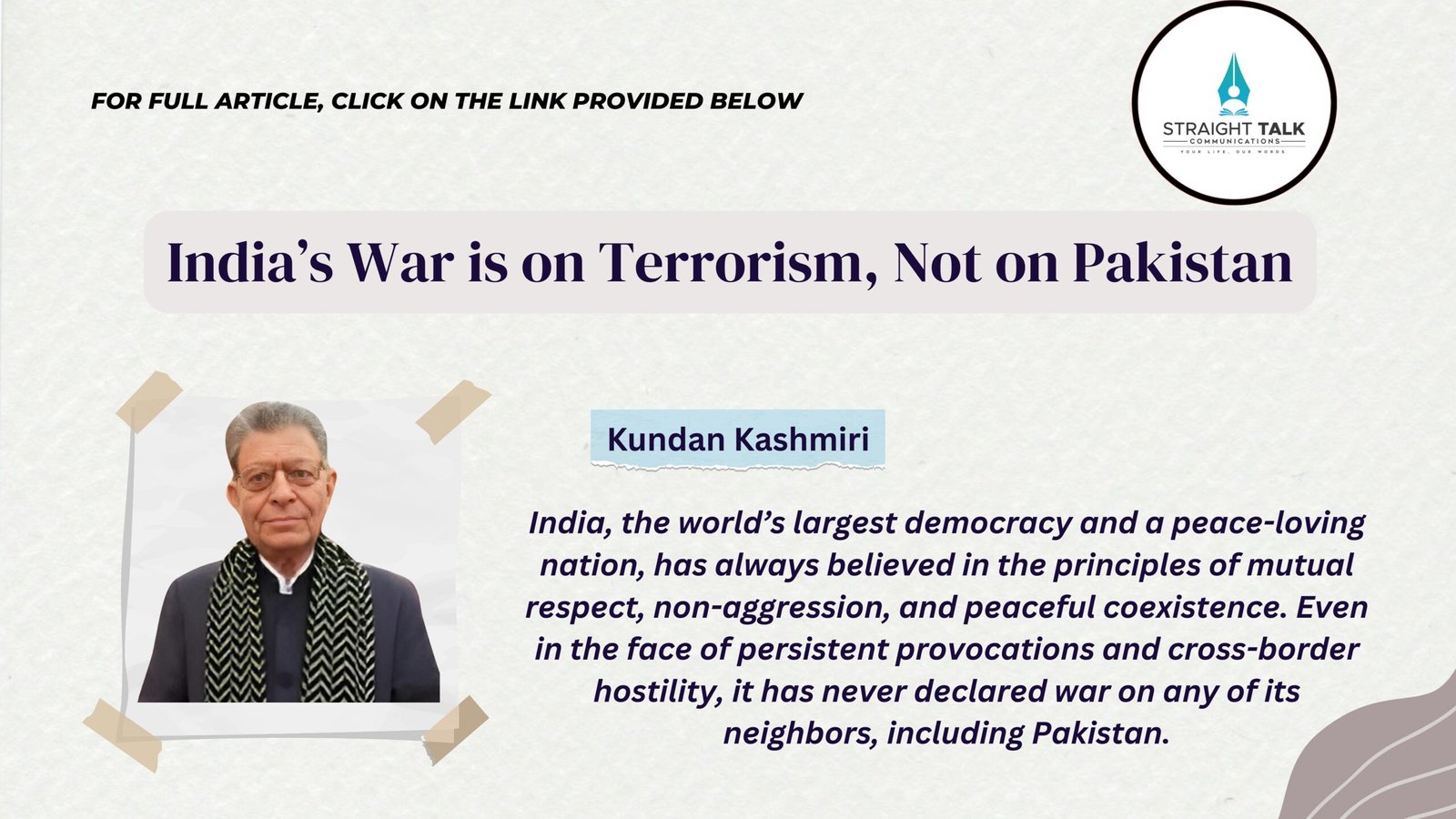India’s War is on Terrorism, Not on Pakistan

Kundan Kashmiri
India, the world’s largest democracy and a peace-loving nation, has always believed in the principles of mutual respect, non-aggression, and peaceful coexistence. Even in the face of persistent provocations and cross-border hostility, it has never declared war on any of its neighbors, including Pakistan. For decades, India has shown unmatched restraint. However, it has also suffered gravely as one of the biggest victims of terrorism in the modern era. The sorrow of thousands of innocent families, the repeated assaults on national sovereignty, and the brutal attacks on civilian life are tragedies born not of Indian intent, but of forces that feed on hatred and violence.
It was in response to this enduring pain that Prime Minister Narendra Modi Ji made a firm and historic commitment: India will not tolerate terrorism in any form. His statement, strong yet fair, did not target any specific country but made it clear that terrorism and its ecosystem, its perpetrators, conspirators, supporters, and financiers—would be dealt with decisively. This was a message of national resolve, not a declaration of war. It was a reaffirmation of India’s duty to protect its people, not a threat to any nation.
Regrettably, Pakistan chose to misrepresent this commitment. Instead of recognizing it as a global call to unite against terrorism, it painted India’s stance as a hostile move. It responded with war hysteria, fear narratives, and dangerous propaganda, once again positioning itself as a victim while conveniently ignoring the presence and activities of terror networks operating from its soil.
India’s response is not rooted in provocation, but in pain. The exodus and massacre of Kashmiri Pandits in the 1990s, the attack on the Indian Parliament in 2001, the horrific 26/11 Mumbai attacks, and the Pulwama suicide bombing in 2019 are just a few examples of the brutal price India has paid. Investigations and evidence have repeatedly pointed to the involvement of elements based in Pakistan. And yet, for years, India relied on diplomacy and international cooperation, choosing dialogue over confrontation.
Under Prime Minister Modi’s leadership, India transformed from silent endurance to strategic clarity. The surgical strikes in 2016 and the Balakot airstrike in 2019 were not acts of aggression, but of precise, responsible self-defense. These operations targeted terror infrastructure, not civilians, and sent a strong message that India would no longer remain passive in the face of calculated violence.
Rather than introspect and act against terrorism, Pakistan has intensified its campaign of misinformation, misguiding its own citizens and attempting to alarm the international community. It has chosen escalation over reflection, deflection over responsibility. Its media and leadership have tried to distort India’s anti-terror resolve into a narrative of hostility and war.
India’s fight is not with the people of Pakistan or with any religion or ideology. It is a moral fight against terrorism, an enemy of humanity. There is a vast difference between a nation defending its citizens and a state allowing its soil to be used for violence. The world must recognize and respect that difference. Prime Minister Modi’s firm stance aligns with global norms and reflects a universal principle: the right of a sovereign nation to protect its people from terror.
India seeks peace, not provocation. It welcomes dialogue, but not at gunpoint. Talks cannot proceed when terror is glorified and infiltrations are a routine. India’s message is clear,, peace must come with accountability, and dialogue must be rooted in sincerity.
This is not a war of bombs and borders. It is a war between justice and cruelty, between truth and propaganda, between the future and fear. India’s resolve is not an invitation to war, it is a promise of protection to its citizens and a call to the world to stand against terrorism. Those who twist this resolve into hostility are either misled or complicit.
India’s cause is just. Its path is firm. Its patience must not be mistaken for weakness. Let the world understand and support this , not because India seeks favor, but because it speaks the truth.
(The author is a freelance writer & President, Kashmiri Pandit Conference. The views are of the author and not of Straight Talk Communications)
[ Kundan Kashmiri]
Freelance Writer & President, Kashmiri Pandit Conference (KPC)
Mobile: 8802167955
Email: kundankashmiri@gmail.com







